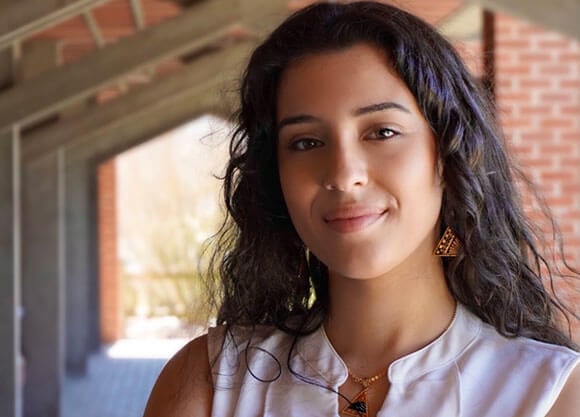
Transferring to a greater opportunity
October 29, 2021

October 29, 2021

Colello is a double transfer student, as she attended the University of Connecticut for three semesters before earning an associate degree in paralegal studies at Naugatuck Community College. She enrolled at Quinnipiac in Fall 2020.
Colello’s time at UConn was cut short when her mother fell gravely ill, and she returned home to Wallingford to act as caregiver.
“After leaving UConn, I thought I might not even finish my bachelor’s. Now I’m applying for Ph. D. programs. I never believed that could be an option,” said Colello.
Though she was accepted into schools such as Monmouth and Temple to finish her four-year degree, its Connecticut locale was only one reason Colello chose to enroll at Quinnipiac.
“I’m a type A personality, so I researched each of the faculty in the political science department. I liked the quality of the faculty, and the kind of work they were doing,” she said.
Fall 2020 saw Quinnipiac’s campus operating in a hybrid learning model. Commuting to class added to this initial disconnect as Colello began her studies and looked to form relationships at her new school.
Colello was especially interested in connecting with members of Quinnipiac’s multicultural community: Her mother is Black, Tahitian and white, and her father is white.
She was soon introduced to the Indigenous Student Union.
“Finding a community with other multicultural people helped me to feel like I have a place here. Especially with commuting, joining this group helped me connect with others,” said Colello.
Participating in the Indigenous Student Union inspired Colello’s political science studies as well. Courses in international relations and colonialism outlined a greater cause for Colello.
“Through my studies, I’ve become interested in international institutions like the United Nations, and the limitations of institutions around causes such as climate justice,” she said.
During Summer 2021, Colello participated in QUIP-RS, the university’s student research program, and was awarded a $4,000 stipend. Her research focused on the idea of a truly level global discourse, and what that might entail.
“For example, there is the way the West thinks of the ocean, and how indigenous islanders think differently around climate change,” she said.
Colello plans to explore this and similar dichotomies concerning power and discourse while pursuing a doctorate. She cites Quinnipiac’s faculty to be especially helpful as she researches and applies to graduate schools, despite the absence of a formal advising program.
“It’s amazing how the faculty happily take time out of their days to explain what a Ph.D. is, what to look for in a program or to check over my admissions essay,” said Colello. “Without their care, I wouldn’t be thinking this way about my future.”
In her final year as a Bobcat, Colello works with the admissions office to welcome those just joining the Quinnipiac community.
“I’ve been a future student a bunch of times, so I know what it’s like to be in their shoes. I like to communicate the opportunity I found here, and why I’m happy I made the choice I did,” she said.
Quinnipiac Today is your source for what's happening throughout #BobcatNation. Sign up for our weekly email newsletter to be among the first to know about news, events and members of our Bobcat family who are making a positive difference in our world.
Sign Up Now